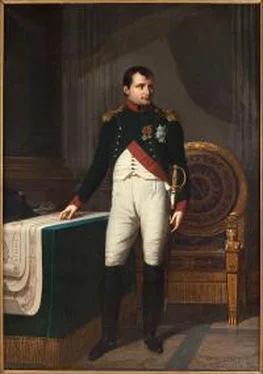Jean Robiquet - Daily Life In France Under Napoleon
Здесь есть возможность читать онлайн «Jean Robiquet - Daily Life In France Under Napoleon» весь текст электронной книги совершенно бесплатно (целиком полную версию без сокращений). В некоторых случаях можно слушать аудио, скачать через торрент в формате fb2 и присутствует краткое содержание. Жанр: История, на английском языке. Описание произведения, (предисловие) а так же отзывы посетителей доступны на портале библиотеки ЛибКат.
- Название:Daily Life In France Under Napoleon
- Автор:
- Жанр:
- Год:неизвестен
- ISBN:нет данных
- Рейтинг книги:4 / 5. Голосов: 1
-
Избранное:Добавить в избранное
- Отзывы:
-
Ваша оценка:
- 80
- 1
- 2
- 3
- 4
- 5
Daily Life In France Under Napoleon: краткое содержание, описание и аннотация
Предлагаем к чтению аннотацию, описание, краткое содержание или предисловие (зависит от того, что написал сам автор книги «Daily Life In France Under Napoleon»). Если вы не нашли необходимую информацию о книге — напишите в комментариях, мы постараемся отыскать её.
Daily Life In France Under Napoleon — читать онлайн бесплатно полную книгу (весь текст) целиком
Ниже представлен текст книги, разбитый по страницам. Система сохранения места последней прочитанной страницы, позволяет с удобством читать онлайн бесплатно книгу «Daily Life In France Under Napoleon», без необходимости каждый раз заново искать на чём Вы остановились. Поставьте закладку, и сможете в любой момент перейти на страницу, на которой закончили чтение.
Интервал:
Закладка:
Everybody supposed that we had at last reached the shores of Ireland, Cafe strategists announced that we had landed 50,000 men. Others, the 'exaggerators', went as far as 150,000.... After all, with a fair wind, you know.... People remained under this delusion for two hours; then they heard there had been no landing: the guns had merely announced the return of the Chief Magistrate of the Republic to the Tuileries.
*It is a happy event,' said a Parisian lady who never lacked wit, 'but you know how one feels when one has made up one's mind to a thing. The truth might be a hundred times better than what one had expected, but one is angry and ashamed at having made a mistake. We were very chapfallen. But it's all over now, weVe forgotten all about it/
Some dramas of the past seem to have made far less impression on the people of their day than they do upon ourselves.
On March 21, 1804, Norvins, having gone out early, heard someone in the Faubourg Saint-Honore saying that the Duke of Enghien had been court-martialled during the night and shot. 'Who's that?' inquired a voice. To which a bourgeois replied, with a vague gesture, 'Probably another of those foreigners/
That evening, in the boxes of the theatres, women showed by their remarks that they knew very little more themselves aoout the family of the Condes.
Although royalist circles were shattered by this event, and diplomatists disturbed, it is therefore probable that there was far less dismay among the other classes of the population. Burning questions of the moment, such as the trial of General Moreau, the suicide of Pichegru, the arrest of Cadoudal, were far more in people's minds than the execution of an unfortunate prince hardly known to the public.
In a few months' time they would think of him still less, for the Empire would by then have been proclaimed. The whole country, no excepting royalist Vendee, would have voted for the 'Pacifier', and the sole subject of conversation in France would be the ceremony of the Sacring, or, more fashionably, the Coronation of Napoleon.
In preparation for the great day thousands of jobs were being feverishly completed in Paris: gravel spread in a great many streets, the kennels of the boulevards filled in, part of the Carrousel cleaned up, the approach to Notre-Dame laid open and a painted canvas gateway erected in front of the Cathedral, which some people took for a copy of Saint Pete/s in Rome, but which Messrs. Percier and Fontaine had merely intended as a decor 'in the Gothic style/
Long before the fixed date, thousands of provincials invaded the capital, some delegated by their home town, others simply as onlookers. When they found the hotels full they camped haphazard with private people who had turned their apartments into dormitories.
December 2 came at last. The cold had been intense the day before, and the morning opened with ice on the ground and flakes of snow in the air. It was only by Napoleon's usual luck that the sun broke through the fog at nine o'clock and the weather became bearable again. And it was at nine o'clock that the Pope's carriages left the Pavilion de Flore and drove towards the Cathedral by way of the Rue Saint-Nicaise, Rue Saint-Honore, the Pont-Neuf and the little streets of the Cite, filled since early dawn with an immense multitude. Let us mingle with the crowd behind the triple rank of soldiers lining the way, and try to note what it will remember of the spectacle.
First of all, no doubt, the jovial face of Monsignor Speroni, cross-bearer to the Holy Father, astride a mule. The Imperial stables, not possessing the orthodox female, had only succeeded in hiring a male of the species for the sum of sixty-seven francs. But the public was not particular on the subject, and gave it a long ovation. 'The Pope's Mule! The Mule [slipper] one kisses!' they shouted, and a gale of laughter saluted, accompanied, pursued the good prelate, who had the sense to laugh himself. 'He knew the Parisians!' 1
*For his trouble, the vendors of caricatures made him popular, and the makers of thermometers forced him to predict bad and fine weather, like Saint Anthony, by going up and down the Papal crozier.
Perhaps he would have known them still better if he had seen them, a few minutes later, suddenly change their attitude and bow as one man at the approach of the Pontiff. Visible to all through the eight windows of his coach, Pius VII, very simply robed, leaned towards the spectators and made the gesture of benediction. Before him, many who were not religious bowed the knee. And the great coach went on its way, at the slow pace of the horses, bearing on its roof the pontifical tiara supported by gilt doves.
Patience would be needed by those waiting to see the other great coach go past, on the roof of which stood the crown of Charlemagne held by eagles. The Emperor was not due to leave the Tuileries until an hour after the Pope, and the infinite complexity of the procession was bound to delay it on its route. In streets, some of which were barely seven yards wide, how would it be possible to keep things moving without collisions - squadrons of riflemen, cuirassiers, mame-lukes and above all, the immense coaches with six horses, carrying pompous dignitaries and bridling princesses, with the finest horsemen of France caracoling alongside?
When at last the procession began, when, after the trumpeters, the kettledrummers, the carabineers, after Murat and his staff, after the main body of cavalry, after the long line of carriages, the huge gilded crate came into sight, in which Napoleon and Josephine were seated, the crowd was less amazed by this monumental coach-building effort than by the strange gala uniform in which its owner was rigged out. Oh, the artists had done their work well! While the architects had been making up the face of Notre-Dame, Isabey and his team had been disguising the Emperor. His Spanish jacket and velvet cap made him look like a character out of the Henriade, And this vaguely troubadour get-up, with feather Mt~bands, ruffs and lace shirt-frills, was worn by all those taking part in the ceremony, from Joseph and Louis to Talleyrand and Fouche and the least of the chamberlains.
Perhaps under the vaulted roof of the church, aided by the majesty of the ceremony, all this fine company would assume the meditative gravity lent it later by the brush of David the painter. But for the moment, in the harsh daylight of the Paris street, the masquerade seemed almost indecent. Many people wondered what had become of the heroes of the Wars of Italy. They looked for the Bonaparte of Marengo and could not recognize him.
Their feelings changed when, towards the end of the afternoon, the procession left the cathedral again. The crowd had only been able to catch the echoes of the long ceremony, but this consecration by Rome of the Emperor of the French made a deep impression on them, none the less. Many families had already dined, for it was now five o'clock, and the December night was falling on the square when the procession was re-formed.
It returned to the Tuileries in the same order as in the morning, but preceded by a multitude of torches and making a wide detour through the quarters of the Right Bank, the better to satisfy the curiosity of the city, Napoleon appeared to be saying to his people; 'Behold my glory; it is your work.'
And in the narrow Rue Saint-Martin with its lighted windows, near the gate of Saint-Denis, decorated with a gigantic N, all along the boulevards, the people responded with a tremendous ovation. As the chain of horsemen, carriages and torch-bearers unrolled its links like those of a giant Tarasque, 1 the cheers broke out in an endless roar, and the day, so unpromising to start with, ended in an apotheosis.
Amid the general enthusiasm, however, certain heads remained cool. Only royalists could have been guilty of publishing lampoons such as Pie se tache [Pius soils his hands], or talk of 'A performance given by the Imperial Players: The Emperor in spite of Everybody, followed by The forced Consent! Only a La Fayette could express astonishment at the whim that had seized Napoleon 'to have a little phial broken over his head.. / Only a man of Stendhal's temperament could write on coming home that evening: Tve been thinking all day about this so obvious alliance of all the charlatans. Religion coming to consecrate tyranny, and all that in the name of human happiness! I washed the bad taste out of my mouth by reading a little of Alfierf s prose. 3
Читать дальшеИнтервал:
Закладка:
Похожие книги на «Daily Life In France Under Napoleon»
Представляем Вашему вниманию похожие книги на «Daily Life In France Under Napoleon» списком для выбора. Мы отобрали схожую по названию и смыслу литературу в надежде предоставить читателям больше вариантов отыскать новые, интересные, ещё непрочитанные произведения.
Обсуждение, отзывы о книге «Daily Life In France Under Napoleon» и просто собственные мнения читателей. Оставьте ваши комментарии, напишите, что Вы думаете о произведении, его смысле или главных героях. Укажите что конкретно понравилось, а что нет, и почему Вы так считаете.












